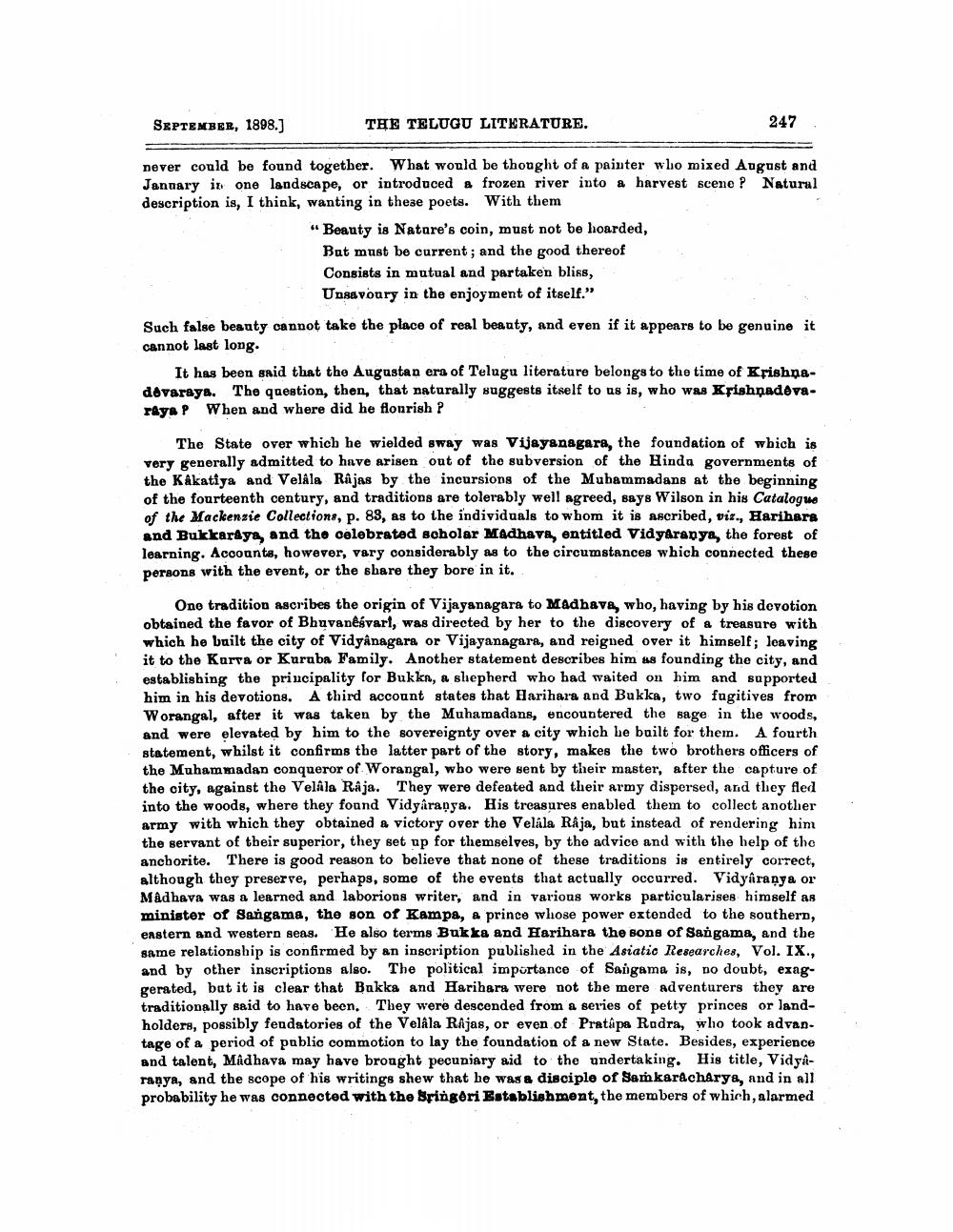________________
THE TELUGU LITERATURE.
SEPTEMBER, 1898.]
never could be found together. What would be thought of a painter who mixed August and January in one landscape, or introduced a frozen river into a harvest scene? Natural description is, I think, wanting in these poets. With them
247
"Beauty is Nature's coin, must not be hoarded, But must be current; and the good thereof Consists in mutual and partaken bliss, Unsavoury in the enjoyment of itself."
Such false beauty cannot take the place of real beauty, and even if it appears to be genuine it cannot last long.
It has been said that the Augustan era of Telugu literature belongs to the time of Krishnadevaraya. The question, then, that naturally suggests itself to us is, who was Krishnadevaraya? When and where did he flourish ?
The State over which he wielded sway was Vijayanagara, the foundation of which is very generally admitted to have arisen out of the subversion of the Hinda governments of the Kakatiya and Velâla Rajas by the incursions of the Muhammadans at the beginning of the fourteenth century, and traditions are tolerably well agreed, says Wilson in his Catalogue of the Mackenzie Collections, p. 83, as to the individuals to whom it is ascribed, viz., Harihara and Bukkaraya, and the celebrated scholar Madhava, entitled Vidyaranya, the forest of learning. Accounts, however, vary considerably as to the circumstances which connected these persons with the event, or the share they bore in it.
One tradition ascribes the origin of Vijayanagara to Madhava, who, having by his devotion obtained the favor of Bhuvanêsvart, was directed by her to the discovery of a treasure with which he built the city of Vidyanagara or Vijayanagara, and reigned over it himself; leaving it to the Kurva or Kuruba Family. Another statement describes him as founding the city, and establishing the principality for Bukka, a shepherd who had waited on him and supported him in his devotions. A third account states that Harihara and Bukka, two fugitives from Worangal, after it was taken by the Muhamadans, encountered the sage in the woods, and were elevated by him to the sovereignty over a city which he built for them. A fourth statement, whilst it confirms the latter part of the story, makes the two brothers officers of the Muhammadan conqueror of Worangal, who were sent by their master, after the capture of the city, against the Velâla Raja. They were defeated and their army dispersed, and they fled into the woods, where they found Vidyaranya. His treasures enabled them to collect another army with which they obtained a victory over the Velála Râja, but instead of rendering him the servant of their superior, they set up for themselves, by the advice and with the help of the anchorite. There is good reason to believe that none of these traditions is entirely correct, although they preserve, perhaps, some of the events that actually occurred. Vidyaranya or Madhava was a learned and laborions writer, and in various works particularises himself as minister of Sangama, the son of Kampa, a prince whose power extended to the southern, eastern and western seas. He also terms Bukka and Harihara the sons of Sangama, and the same relationship is confirmed by an inscription published in the Asiatic Researches, Vol. IX., and by other inscriptions also. The political importance of Sangama is, no doubt, exaggerated, but it is clear that Bakka and Harihara were not the mere adventurers they are traditionally said to have been. They were descended from a series of petty princes or landholders, possibly fendstories of the Velâla Râjas, or even of Pratapa Rudra, who took advantage of a period of public commotion to lay the foundation of a new State. Besides, experience and talent, Madhava may have brought pecuniary aid to the undertaking. His title, Vidyaranya, and the scope of his writings shew that he was a disciple of Samkaracharya, and in all probability he was connected with the Sringeri Establishment, the members of which, alarmed




